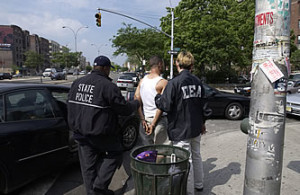Whether you have a small amount of a recreational drug on your person, or a larger quantity for distribution, there are circumstances where you can fight a drug possession charge and create reasonable doubt sufficient enough to reduce your sentencing.
In all cases in the United States it is illegal to possess any amount of an illicit substance. That can also include selling medications that are prescribed to others, for recreational purposes. This article will explain how drugs are classified in terms of federal offenses, and provide advice on what you can do to fight a drug possession charge successfully.
Penalties for Drug Possession in Illinois
The Federal Government provides a classification for illicit substances based on three categories. The categories and drugs in each class, are defined by their severity in terms of addictive properties and risk of loss of life, and other criterion.
The Federal categories or drug schedules are outlined as follows:
Schedule I
Drugs identified under Schedule 1 (according to Federal classifications) are the most lethal and dangerous types of drugs which are subject to the highest restrictions by the United States law. For individuals charged with possession of schedule one drugs, or with trafficking of drugs in this category, the penalties are severe. It should be noted that despite the legalized use of marijuana in some States and for medicinal prescription purposes, in court rulings as recent as April 2015 Cannabis was still determined to be a Schedule 1 drug legally in the United States.
Drugs included in this classification are: Heroin, Ecstacy (MMDA), LSD and Mescaline and Marijuana.
Schedule 2
Drugs classified under Schedule 2 are less dangerous, and present a lesser addiction risk as compared to Schedule 1 drugs. Nonetheless the drugs outlined in Schedule 2 remain dangerous to the health of users and highly addictive.
Drugs included in this classification are: Cocaine, Crystal Meth (Methamphetamines) and Methadone.
Schedule 3
The drugs classified in Schedule 3 represent the least threat in terms of illicit drugs and substances, and most frequently refer to prescription or enhancing drugs that are abused for recreational purposes.
Drugs included in this classification are: Steroids, Valium, Xanax and many other prescription pain killers or mood management drugs.
When it comes to management of classifications that the state level, some states refer to all illicit substances in equal terms, particularly on charges of trafficking, but differentiate between narcotics and other substances. For more information on sentencing and punitive fines for drug related charges, see the “Drug Offenses: Maximum Fines and Terms of Imprisonment for Violation of the Federal Controlled Substances Act and Related Laws” (2015).
Recommended Behavior While Being Searched for Drugs
No matter where a drug search occurs, in a residence, in a public building or facility, or even in your car when stopped by the authorities, you have specific rights that protect you against unreasonable search. Understanding your rights can help determine how you should behave, what you should say and how little you incriminate yourself during a routine search.
When you are stopped by police officer who is not wearing a uniform, you have the right to request to see their badge or warrant. Frequently in the case of drug trafficking or suspected drug use, plain clothed police officers will be used by the authorities to collect evidence to assist with the drug conviction. However in the interest personal safety, an undercover drug officer must identify himself or herself when asked during a search or arrest.
Your clothing, your vehicle and your own personal residence searched on a reasonable suspicion that you are in possession of any number of controlled goods, including firearms or weapons, knives and blades which may have been used in an assault. You may also be searched on suspicion of possession of stolen goods, or on suspicion of purchasing or facilitating the purchase of stolen goods.
When you are being searched, if you are being arrested and taken into custody by the authorities you must be read your rights according to the Miranda law. You always have the right to remain silent and in some cases this is the best option until you’ve had an opportunity speak with a legal representative. However in the case of an illegal search, where you have committed no crime, the ability to explain to the authorities your reason for being there or plausible explanation may actually support your defense if you make a statement at that time. If you are of course guilty and being searched, the best measure is to remain silent to avoid incriminating yourself further.
The Power of Plausible Denial
It is little more difficult to claim ignorance if the drugs are located in a personal area, such as a bedroom or inside your personal effects such as a backpack, purse or your own personal vehicle. In cases where the evidence clearly points to ownership of illicit substances, consulting with Chicago drug lawyers is the best next step in a quality defense.
If your home or private property was searched, and you had no knowledge of drugs on the premises, it is best to be honest and deny your knowledge of the illicit substances, and place the burden of proving beyond a reasonable doubt that you owned, or condoned the use of drugs on your property on the prosecution.
( Image Source – 1)


